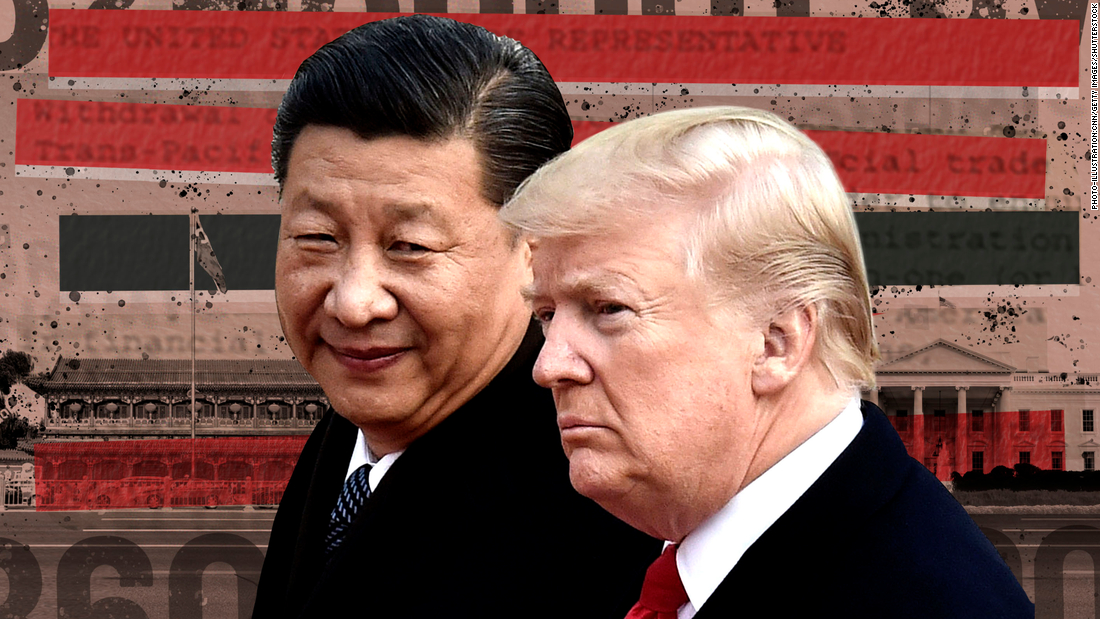
How Trump could have helped Xi
Less than a week before Trump took office in January 2017, Xi took the stage in Davos, Switzerland, at what appeared to be the dawn of a golden era for China and Beijing's international influence.
In a speech to the global liberal elite at the World Economic Forum, held in the Swiss Alps, Xi called for countries to shun protectionism in a clear swipe at Trump's "America First" rhetoric.
His speech was well received among economic leaders.
Philippine President Rodrigo Duterte, leader of one of the US's closest allies in Asia, said that he "loved" Xi Jinping.
"I think at the start of the Trump administration, China was being seen by the rest of the world as a country which potentially could provide a good steadying role in steering the world though the next turbulent phase in the coming few years," said Steve Tsang, director of the SOAS China Institute think tank in London.
In short, "the Trump administration was a godsend for the Communist Party of China," said Tsang.
Why it went wrong
Yet in October 2020, nearly four years after Trump was inaugurated, China's global reputation is at its lowest point in years.
A massive 74% view China unfavorably.
The coronavirus pandemic, first reported in the Chinese city of Wuhan in December 2019, has severely damaged Beijing's reputation as countries struggle to deal with rising caseloads.
Zhao was later promoted, becoming one of three rotating spokespeople for the Chinese Foreign Ministry.
Though the aggressive behavior has estranged diplomatic partners, Jessica Chen Weiss, associate professor of government at Cornell University, said the real target remains domestic.
According to Weiss, the authoritarian nature of China's government means that it can't brook any concession internationally that might seem like weakness at home.
To the Communist Party, weakness might spell the end of its time in power.
"When push comes to the shove the Chinese government has to first and foremost focus on regime security," said Weiss.
Experts say that in recent months there has been discussion within the Chinese government over whether these "wolf warrior" tactics have hurt their country more than they've helped.
But for now, with international concerns over its handling of the coronavirus growing louder, any chance of a short-term revival for Beijing's global reputation seems unlikely.
Weiss said that, in fact, China's system of government may not actually have ever been up to the challenge of becoming the world's leading superpower, at least not in the model of the US.
The Chinese government places as much importance on being feared as being loved, Weiss said, and that severely limits its ability to wield soft power and form close diplomatic relationships.
According to Weiss, China is unlikely to take the US' place, no matter how much Trump pulled back on the world stage.
"(Beijing wants to ensure) that nobody thinks China can be pushed around, or taken advantage of," she said.
"That emphasis on deterrence and intimidating dissent has conveyed Chinese resolve but it undercuts Beijing's efforts to showcase its international image as a benign global leader."
Broken bond
This year, Trump has been eager to inflame popular anger against China for its handling of Covid-19 -- at least in part to distract from his administration's own failure to contain the virus domestically.
He regularly describes the disease as the "China virus" and has placed a large proportion of the blame for the escalating US epidemic at Beijing's door.
Yet despite his regular attacks on China, Trump never attacks Xi personally.
On August 11, seemingly more in sorrow than anger, Trump said he used to like Xi, but he didn't "feel the same way now."
"I had a very, very good relationship, and I haven't spoken to him in a long time," he told Fox Sports Radio.
Xi and Trump are now a long way from where they started three and a half years ago, and in that time Beijing's reputation around the world has suffered.
Those voices are only likely to grow louder ahead of the 2022 National People's Congress in China, where Xi would normally be expected to hand over power to a chosen successor.
"I suspect that Xi might be facing some internal challenges from people within the Communist Party who are not happy about his heavy-handed style," said He, the Lehigh University China expert.
But whether or not China has taken advantage of the Trump administration's shrunken presence on the world stage, experts said that in the long run, the fundamentals favor Beijing and Xi.
Russel said that the US and other leading nations were heavily reliant on China and the massive wealth generated by its economy, making any moves towards a broader decoupling and a return to a Cold War level of separation unlikely.
"If you look at it from China's point of view ...